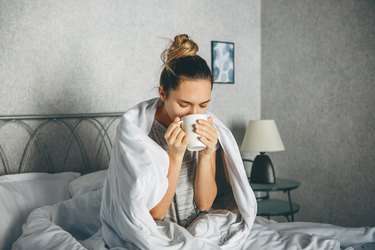
You may find few things more relaxing than winding down with a steaming cup of herbal tea as you cozy up for bed at night.
While there are several herbal teas marketed to help you doze off and get a sounder sleep, the evidence is mixed — largely because it's difficult to study herbal tea intake and sleep quality in a large population over a period of time.
Video of the Day
Video of the Day
"It's really hard to get a good study out there, but researchers have tried," says Raj Dasgupta, MD, FAASM, a pulmonary and sleep doctor and associate professor at the University of Southern California. "Chances are, you'll see mixed evidence — in some cases, you'll have positive results and in others, you won't."
That said, good sleep involves bringing together many puzzle pieces: Some things that can help you get better sleep include going to bed and getting up at the same time every day, avoiding heavy meals before bed and creating a restful environment, say, by keeping the room dark and quiet or doing calming activities before bed, per the Mayo Clinic.
"Tea by itself can never solve your sleep problems," Dr. Dasgupta says. "What helps more is having your favorite tea at night along with a set bedtime and wake-up time, exercising during the day and putting technology away."
Herbal teas won't be a cure-all for your sleep woes, but they may contribute to that relaxing routine, helping you create a proper foundation for catching zzzs.
"I think there are two parts to this: the tea and the ritual," says Michael Breus, PhD, a sleep specialist and fellow of the American Academy of Sleep Medicine. "The ritual can also have a calming effect."
Meanwhile, certain ingredients in tea may also help promote sleep. Try these best teas for sleep if you want sweet slumber tonight.
1. Chamomile Tea
Chamomile comes to mind when we think "bedtime," and it has been used for years as a calming brew before bed.
"The plant itself contains apigenin, a compound that binds to the same receptors in the brain as drugs used to treat anxiety and insomnia, called benzodiazepines, and has been shown to produce a mild sedative effect," Dr. Breus says.
Insomnia is more common in older adults, and chamomile is one medicinal plant that may help promote sleep. Nursing home residents who took 400 milligrams of chamomile extract daily had better sleep quality than those who took a placebo in a small December 2017 study in the journal Complementary Therapies in Medicine.
The benefits aren't just for older adults: When 80 postnatal people with poor sleep drank chamomile tea for 2 weeks or received regular postpartum care, the chamomile tea group had significantly lower scores of sleep inefficiency and depression, per a February 2016 study in the Journal of Advanced Nursing. The effects seemed to be limited to the immediate term, as the scores were similar between groups 4 weeks after the test.
That said, the research is inconsistent — not all studies have been able to confirm the link between chamomile and better sleep. Still, chamomile may offer other benefits that make it worth trying.
"Regardless of sleep, chamomile extract has been used for its anti-inflammatory properties and it might help out with anxiety," Dr. Dasgupta says, adding that its benefits are likely due to chamomile's antioxidants.
Chamomile Teas to Buy
2. Lavender Tea
If you've ever used lavender essential oil in a diffuser or spritzed lavender spray on your pillow, you know how calming it can be.
"Lavender's claim to fame is that it's very relaxing," Dr. Dasgupta says. "It's had some studies with, again, mixed results, but it is a classic tea for sleep that jumps to mind."
Smelling and drinking lavender tea for two weeks daily led to fewer reports of fatigue in sleep-disturbed postnatal people, it didn't affect sleep quality, per another December 2015 study in Worldviews on Evidence Based Nursing.
But the flower seems to work best when sniffed: Women ages 45 to 55 used lavender aromatherapy for 20 minutes twice weekly for 12 weeks and saw an improvement in sleep quality and heart rate variability compared to those in a control group, per an August 2011 study in Evidence-Based Complementary and Alternative Medicine.
And the scent of lavender improved sleep quality, per a March 2013 review in Evidence-Based Complementary and Alternative Medicine.
Lavender Teas to Buy
3. Valerian Root
You've likely seen valerian root touted on the boxes of several nighttime teas. It's been used for several years and marketed for insomnia, stress relief, anxiety and sleep.
"Valerian root works on a neurotransmitter known as gamma-aminobutyric acid (GABA), which promotes sleep," Dr. Dasgupta says. "Many of the prescription sleeping aids such as Ambien, Sonata, Lunesta or even Xanax all work on GABA."
Much of the research done on valerian root and sleep is decades-old or has inconsistent methodologies, but an October 2020 study in the Journal of Evidence-Based Integrative Medicine sought to update and re-evaluate the available data: The researchers found that while evidence is limited, "valerian could be a safe and useful herb alone and also in combination in treating sleep problems, anxiety and associated comorbidities."
They note that valerian may be particularly useful in treating insomnia in people with high levels of anxiety.
- Mayo Clinic: "Sleep tips: 6 steps to better sleep"
- Complementary Therapies in Medicine: "The effects of chamomile extract on sleep quality among elderly people: A clinical trial"
- Journal of Advanced Nursing: "Effects of an intervention with drinking chamomile tea on sleep quality and depression in sleep disturbed postnatal women: a randomized controlled trial"
- Evidence-Based Complementary and Alternative Medicine: "The Effect of Lavender Aromatherapy on Autonomic Nervous System in Midlife Women with Insomnia"
- Worldviews on Evidence Based Nursing: "Effects of Lavender Tea on Fatigue, Depression, and Maternal-Infant Attachment in Sleep-Disturbed Postnatal Women"
- Evidence-Based Complementary and Alternative Medicine: "Lavender and the Nervous System"
- Journal of Evidence-Based Integrative Medicine: "Valerian Root in Treating Sleep Problems and Associated Disorders—A Systematic Review and Meta-Analysis"
- University of Utah Health: "Benefits of Turmeric"
- Phytomedicine: "Possible nitric oxide modulation in protective effect of (Curcuma longa, Zingiberaceae) against sleep deprivation-induced behavioral alterations and oxidative damage in mice"
- MyFoodData: "Whole Milk"
- MyFoodData: "Unsweetened Almond Milk"


